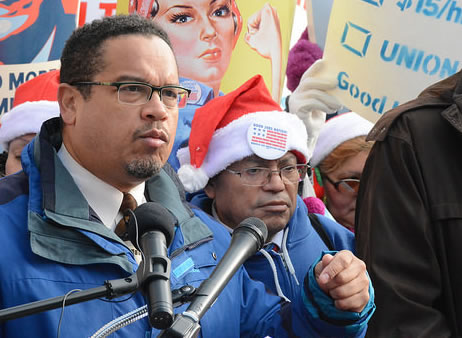

Share
U.S., Canadian and independent Mexican union leaders said they and their members will jointly fight for a strong, pro-worker, new NAFTA, North American Free Trade Agreement. But if they can’t achieve that, they’ll fight equally hard to beat it.
The leaders – including AFL-CIO President Richard Trumka, Steelworkers President Leo Gerard, Teamsters President Jim Hoffa, Canadian Teamsters President Francois LaPorte and Napoleon Gomez Urrutia, president of the independent Mexican metal workers and miners union, Los Mineros – drew strong support for that stand from top congressional Democrats at a joint press conference last week.
“We actually have a chance to rewrite the rules to benefit working people,” not just in NAFTA but for trade pacts in general, Trumka said. “That’s why we stand together united.”
U.S. Representatives Keith Ellison, DFL-Minn., Rosa DeLauro, D-Conn., Sandy Levin, D-Mich., and Bobby Scott, D-Va., all emphasized how the current NAFTA has cost U.S. jobs, just as unions predicted a quarter of a century ago. And if a new NAFTA doesn’t raise Mexican wages above current exploitative levels and better workers’ rights in all three nations, they promised to strongly fight it and defeat it.
The leaders and the lawmakers spoke as bargaining for a “new NAFTA” continued across the Potomac River from D.C., in Alexandria, Va., just after Canadian Prime Minister Justin Trudeau met GOP President Donald Trump and lawmakers to discuss rewriting the 25-year-old so-called “free trade” pact. The talks are scheduled to continue through Oct. 17.
The shape of the “new NAFTA” is important to workers in all three countries, Trumka and the others said. The current NAFTA, written behind closed doors to, they said, benefit multinational corporations, cost the U.S. at least 1 million jobs, according to Labor Department figures, they pointed out.
“I call that social dumping,” said Gerard. He specifically cited the case of Carrier, a subsidiary of United Technologies, taking hundreds of union jobs from an Indianapolis furnace-making plant to Mexico, despite the “deal” then-President Elect Trump trumpeted to keep Carrier jobs in the U.S.
Gerard also demanded “sunset” provisions in a new NAFTA. Had the old one had them, it would have been junked for failing to meet its promises, he added.
NAFTA has produced a “race to the bottom” in all three nations, Trumka said. Since it took effect, Mexican real wages fell 9 percent and half of Mexicans live below their nation’s poverty line, speakers said. Wages in the U.S. and Canada have declined or been flat, they added. “Mexican wages are in some cases lower than those in China,” Gerard said.
“We want to have a NAFTA that increases standards across the board,” in wages, working conditions and the right to unionize, in all three countries, Hoffa said. “Wages at Goodyear” in Mexico “are $1.78 an hour. Who can compete with that?”
The current NAFTA has unenforceable and unenforced labor “side letters.” They don’t bar Mexican government- and industry-controlled unions, which negotiate sweetheart deals for the multinationals and keep wages low. Los Mineros is the exception to that pattern.
“We are the victims of exploitation,” Gomez Urrutia said of Mexican workers. “The government of Mexico, in alliance with the multinationals, has systematically denied rights to Mexican workers. And it supports corrupt unionism. And U.S. and Canadian workers will not make progress until Mexican wages increase, not U.S. and Canadian wages decline.”
The Canadian government is pushing for strong worker rights south of the U.S.-Canada border, not just in Mexico, but in the U.S. It says weak U.S. labor laws, and in particular so-called “right to work” laws, disadvantage Canadian workers. After union lobbying, Canada demands RTW repeal in a new NAFTA.
Ellison said lawmakers and unions must undertake a massive education job to force pressure on U.S. bargainers to produce a new, pro-worker NAFTA.
“If you’re not in a union, this is your issue as well,” said the Minnesotan. “We’re asking folks to get involved, to have community meetings, to use social media” and to force production of a pro-worker NAFTA, or defeat of an anti-worker pact.

